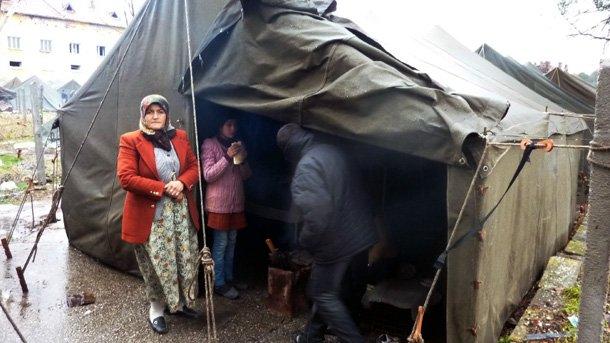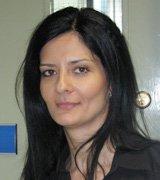
From one of the best refugee camps in Sofia we head for the camp that has the most problems – the one in Harmanly, close to the border with Turkey, the country the bulk of immigrants come from. Opened in a hurry at the beginning of August, it was overcrowded before the construction work was even completed. It was supposed to offer the best conditions – family caravans with bathroom and kitchen, hot water and central heating for 430. At the moment the camp accommodates 1,300 refugees, most of them living in tents, right on the bare ground, they don’t have water, electricity or heating. Electricity was only installed in the caravans a week ago. The old barracks are being renovated so that the people from the tents can be transferred there and should be ready within 10 days. In Harmanly there are 300 children and some 20 pregnant women. The expression used most often here is mafi, in Arabic meaning there isn’t any.
In front of one of the tents we see the sad eyes of a little boy who is running a fever. His grandmother Nerima says:
“We are all fleeing from the horrors of war. But here at the camp conditions are very bad, there is no water, no sewerage, no money, no food, no medicines, our children are all sick now that it is cold. We hope so very much to go to Western Europe. I have a brother and a sister in Germany and cousins in France. If conditions were better here we wouldn’t want to go anywhere else.”
We are at the camp at one of the rare times when a charity organization is making a donation. The protestant church and the Samaritans association from Stara Zagora have brought shoes and clothes for the people from the tents, all of them soaked to the skin and freezing. They sit in front of their tents warming themselves by large tins where they burn anything they can find. They use empty cans for plates. Humanitarian organizations have brought two pediatricians here to take a look at the children. Some of them are taken to the hospital in Harmanly with otitis and bronchitis. The volunteers travel to the town to buy and donate the necessary medicines. A Palestinian doctor from Jordan who has studied and now lives in Bulgaria helps his colleagues with the translation.

“Most of the children have a cough, a cold or bronchitis, otitis and almost all of them have diarrhea and stomach pains,” he says. ”We came here to help any way we can. Conditions are awful here. It is raining, cold and you can see for yourselves how people are living here. The living conditions are like in the refugee camps in Vietnam in the 70’s and Cambodia in the 60’s. But it is a disgrace to have living conditions like this in a European country.”

I am very angry, says Diana Dimova from the Samaritans association. This is her third visit to the camp and things are getting worse, rather than the other way round.
“The conditions are horrific,” she says. “Night time temperatures drop below zero. If things go on like this I expect people to die. This is a humanitarian crisis. We realize it is not easy to cope with 10,000 refugees. But so much time has gone by and I still don’t see a clear plan of action, everything is total chaos. I feel for the police working here, and for the social services from the town who volunteer to try to help these people, but they have neither the strength nor the money.”
The camp’s director Zhelyo Zhelev is also angry because during a recent riot, the refugees smashed some of the new bathrooms and toilets in the caravans. He says that by doing so they were hoping to be transferred sooner to another country with better conditions. Does he feel abandoned by the government?
“I think we have been abandoned by Europe, not by the government,” he says. “The government is doing its job, but Bulgaria’s capacity is small. We are a nation of 7 million, the population of a large European city. Our people here are badly paid and themselves emigrate to Europe. We need money to provide refugees with a decent quality of life, as well as human resources which have been exhausted.”
English version: Milena Daynova
Photos: Maria Dimitrova-Pichot
The tallest Ferris wheel in Bulgaria will rise above Pleven , announced regional governor Nikolay Abrashev. It will be built in a multifunctional complex near the Kaylaka Park. "The project envisages the construction of a Ferris wheel with a..
The town of Elena, Veliko Tarnovo region, will welcome thousands of guests for the Feast of the Elena pork leg meat delicacy . Balkan masters will demonstrate their culinary art on Saturday and Sunday, BNR correspondent Zdravka Maslyankova reported...
The international wine festival "Bolgrad Wine Fest" is opening today in the unofficial capital of ethnic Bulgarians in Ukraine - Bolgrad. The two-day event will be held at the Center for Culture and Recreation. For the first time, within the..
For the 30th consecutive year, the Bulgarian Posts organize a contest for the most beautiful letter to Santa Claus. Letters must be sent by 18..

+359 2 9336 661
